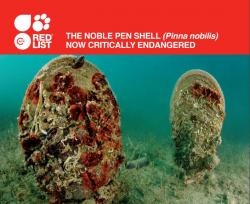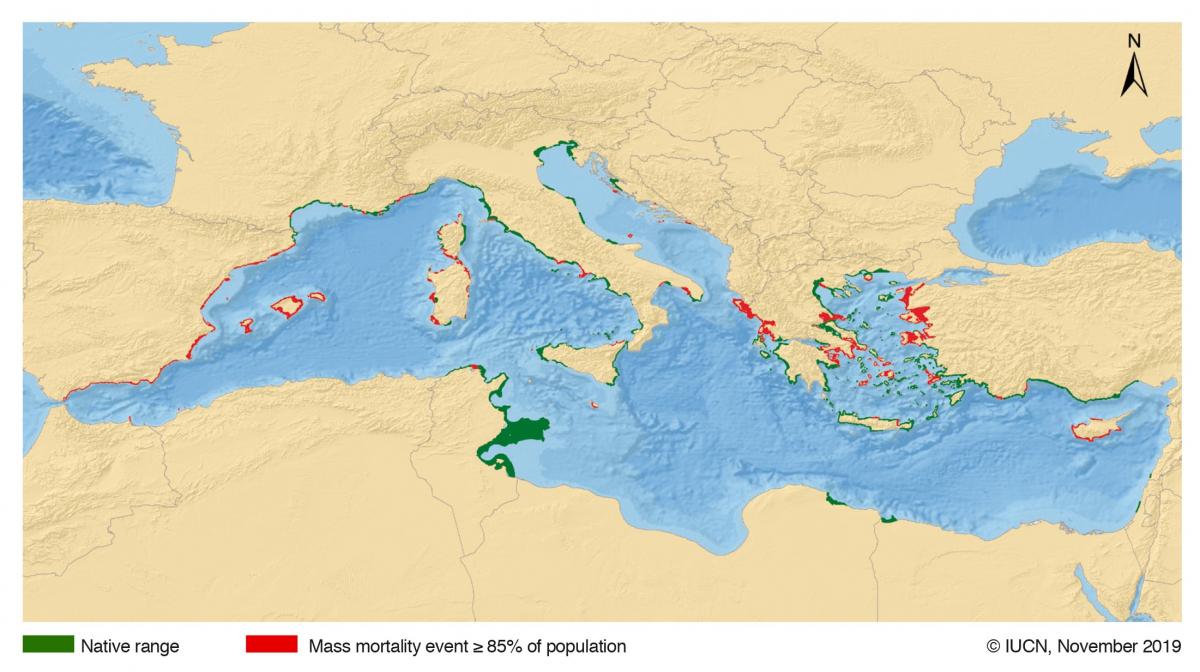Mediterranean Noble Pen Shell Crisis (Pinna nobilis) - January 2021 Update
Thanks to the data provided by conservation organisations and institutions from all over the Mediterranean, IUCN-Med has worked to produce the Red List Assessment of the Mediterranean Fan Mussel (Pinna nobilis) which is now officially recognised and listed as "Critically Endangered" by the IUCN Red List of Threatened Species. In case you have information about non-affected areas please let us know. Latest mortality spots detected in Greece, Croatia, Turkey, Tunisia, France and Morocco.
Parasite causing massive outbreak of Mediterranean penshell Pinna nobilis continues to extend rapidly, revealing need for further and urgent action.Following a first outbreak in 2016, which caused the mortality of around 99% of the population in Spain, the spread of a disease caused by an haplosporidian parasit and perhaps other mycobacteria is seriously threatening the survival of the Mediterranean’s biggest bivalve mollusc.
The Mediterranean Fan Mussel - Pinna Nobilis - enters IUCN's Red List as Criticallly Endangered (CR)
 Photo: IUCN-Med
Photo: IUCN-Med
Learn more on IUCN-Med's factsheet.
Recommended actions to address the critically endangered situation of Pinna nobilis
IUCN's recommendations aim to achieve a better understanding of the Pinna nobilis' situation and to prepare an action programme in both affected and still unaffected areas, including:
- Mapping the situation along all coasts, monitoring every 2-3 months to know the status of the populations and if any recruitment is happening even after the mortality event has occurred.
- The populations in lagoons and enclosed bays have been less affected by these mortality events. These areas need to be closely monitored. It is important to develop actions to promote the survival of natural recruitment in these areas.
- Identifying high-density Pinna nobilis hotspots. Targeted transfer of pen shells from highly dense grounds to analyze breeding or replacement in areas where pen shells can’t be found (particularly in inner bays or small lagoons) are also recommended. Caution should be taken to translocate pen shells from the sea to other areas with Pinna to avoid transmission of the disease.
- The eventual recovery of impacted populations will depend mainly on the existence of unimpacted populations, resistant individuals and recruitment. Therefore, it is extremely important to enhance larval recruitment and verify if larvae coming from unaffected sites or resistant individuals are reaching the impacted areas, thus potentially contributing to eventual recoveries. For further details, please read the following specific guidelines to construct and install Pinna nobilis larval collectors:
https://www.iucn.org/sites/dev/files/content/documents/2019/larval_colectors_p._nobilis_guidance_-_pinna_nobilis.pdf
Acknowledgements to all colleagues for the information provided
- Ministry of Environment, Oceanographic Institute, Instituto Oceoanográfico, Laboratorio de Investigaciones Marinas y Acuicultura, University of Valencia (Spain)
- ISPRA and Italian Network (Italy)
- Institut Pascale, Institut océanographique Paul Ricard and French network collaborators (France)
- University of Oran (Argelia)
- Hellenic Centre of Marine Research (Greece)
- Enalia (Cyprus)
- Çanakkale Onsekiz Mar University, Turkish Marine Research Foundation, Institute of Marine Sciences METU and DEU-IMST(Turkey)
- APAL, Tunisian researchers and partners: équipe MAIN/ASSEB, NGB/APPAL (Tunisia)
- Fishermen association, PIM/APAL/ASKJ, University of Malta (Malta)
- Agricultural University of Tirana (Albania)
- Marine Explorers Society - 20000 Leagues (Croatia)
- Network of Mediterranean divers, fishermen, researchers and swimmers
For further enquiries, please contact María del Mar Otero





